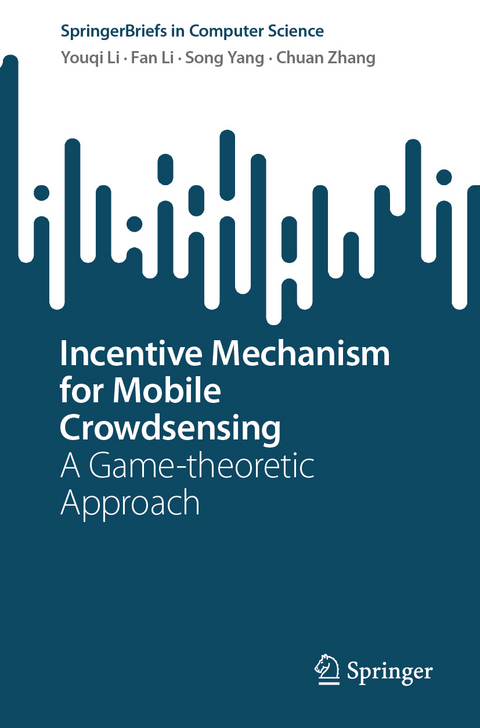
Incentive Mechanism for Mobile Crowdsensing
Springer Verlag, Singapore
978-981-99-6920-3 (ISBN)
This book sheds light on the design of incentive mechanisms for MCS in the context of game theory. Particularly, this book presents several game-theoretic models for MCS in different scenarios. In Chapter 1, the authors present an overview of MCS and state the significance of incentive mechanism for MCS. Then, in Chapter 2, 3, 4, and 5, the authors propose a long-term incentive mechanism, a fair incentive mechanism, a collaborative incentive mechanism, and a coopetition-aware incentive mechanism for MCS, respectively. Finally, Chapter 6 summarizes this book and point out the future directions.
This book is of particular interest to the readers and researchers in the field of IoT research, especially in the interdisciplinary field of network economics and IoT.
Youqi Li is currently an assistant professor in the School of Computer Science and Technology, Beijing Institute of Technology, China. He received the PhD degree in Computer Science and Technology from Beijing Institute of Technology, China, in 2020. From 2020 to 2022, he worked as postdoc researcher in the School of Cyberspace Science and Technology, Beijing Institute of Technology. His research interests include mobile crowdsensing, privacy, game theory, and federated learning. Fan Li is currently a professor at the School of Computer Science and Technology in Beijing Institute of Technology, China. She received her PhD degree in Computer Science from the University of North Carolina at Charlotte, MEng degree in Electrical Engineering from the University of Delaware, MEng and BEng degrees in communications and information system from Huazhong University of Science and Technology, China, respectively. Her current research focuses on wireless networks, smartsensing, crowdsensing, and mobile computing. Her papers won Best Paper Awards from IEEE MASS (2013), IEEE IPCCC (2013), ACM MobiHoc (2014), and Tsinghua Science and Technology (2015). She is a member of ACM and IEEE. Song Yang is currently an associate professor at School of Computer Science in Beijing Institute of Technology, China. Song Yang received the BS degree in software engineering and the MS degree in computer science from Dalian University of Technology, Dalian, Liaoning, China, in 2008 and 2010, respectively, and the PhD degree from Delft University of Technology, the Netherlands, in 2015. From August 2015 to August 2017, he worked as postdoc researcher for the EU FP7 Marie Curie Actions CleanSky Project in Gesellschaft fur wissenschaftliche Datenverarbeitung mbH Goettingen (GWDG), Goettingen, Germany. His research interests focus data communication networks, cloud/edge computing, and network function virtualization. Chuan Zhang is currentlyan assistant professor at School of Cyberspace Science and Technology, Beijing Institute of Technology, China. He received his PhD degree in computer science from Beijing Institute of Technology, China, in 2021. He was a visiting student with the School of Electrical and Computer Engineering, University of Waterloo, Canada. He has published over 30 journal and conference papers. His research interests include secure data services in cloud computing, applied cryptography, machine learning, and blockchain.
Chapter 1: A Brief Introduction.- Chapter 2: Long-term Incentive Mechanism for Mobile Crowdsensing.- Chapter 3: Fair Incentive Mechanism for Mobile Crowdsensing.- Chapter 4: Collaborative Incentive Mechanism for Mobile Crowdsensing.- Chapter 5: Coopetition-aware Incentive Mechanism for Mobile Crowdsensing.- Chapter 6: Summary.
| Erscheinungsdatum | 11.01.2024 |
|---|---|
| Reihe/Serie | SpringerBriefs in Computer Science |
| Zusatzinfo | 1 Illustrations, black and white; XI, 129 p. 1 illus. |
| Verlagsort | Singapore |
| Sprache | englisch |
| Maße | 155 x 235 mm |
| Themenwelt | Informatik ► Datenbanken ► Data Warehouse / Data Mining |
| Mathematik / Informatik ► Informatik ► Netzwerke | |
| Informatik ► Software Entwicklung ► Mobile- / App-Entwicklung | |
| Mathematik / Informatik ► Informatik ► Theorie / Studium | |
| Technik ► Elektrotechnik / Energietechnik | |
| Schlagworte | data collection • Game Theory • Incentive Mechanism • mobile crowdsensing • Mobile crowdsourcing • Optimization • Pricing • Stackelberg Game |
| ISBN-10 | 981-99-6920-4 / 9819969204 |
| ISBN-13 | 978-981-99-6920-3 / 9789819969203 |
| Zustand | Neuware |
| Haben Sie eine Frage zum Produkt? |
aus dem Bereich


